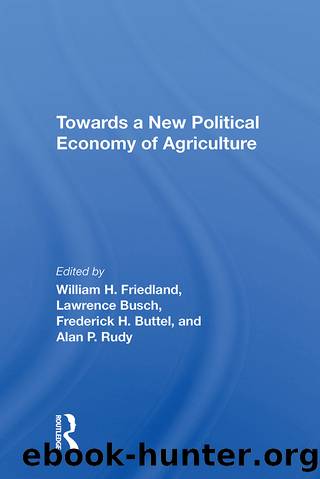Towards A New Political Economy Of Agriculture by William H Friedland

Author:William H Friedland [Friedland, William H]
Language: eng
Format: epub
ISBN: 9780367212001
Barnesnoble:
Publisher: Taylor & Francis
Published: 2021-11-29T00:00:00+00:00
9
The Political Economy of Agricultural Research in the Third World
* * *
Shripad D. Deo
Louis E. Swanson
DOI: 10.4324/9780429269493-12
Scientific activity, the scientists' role and the scientific community have always been dependent; they exist, are valued, and supported in so far as the state or its various agencies see point in them (Shapin and Schaffer 1985:339).
Those who want to change society are not gods living outside of it: there is s wide margin between goals that they think they are adopting, those that they really (often implicitly) adopt, and the results obtained (Amin 1980:1).
In addressing the role of agricultural science and technology in the development of neo-imperialism, it is important to recognize that, during the ten millenia of the development of agricultural technology, a vast array of appropriate technologies arose via folk knowledge and experience. This is not to romanticize premodern agricultural practices, which tended to encompass repressive social relations and low standards of living. Rather, the key is to contextualize die current meaning of science for "developing" societies. Agricultural technologies are dialectical processes inexorably tied to the quantitative and qualitative changes of a myriad of social relations within political economies (Levins and Lewontin 1985).
We wish to thank Michael Hansen, Paul Marcotte, Edmund Oasa and Jose de Souza Silva for their comments on an earlier draft of this paper and Veena Deo for her editorial assistance. In all fairness, however, we absolve them of responsibility for the final product
Any discussion of the political economy of agricultural research must, therefore, articulate the political and economic objectives of such research as a means to historically conditioned social ends. This is in contrast to die enlightenment's romantic view of science as a liberatory and neutral agent of modernization. This modernization view is not just inaccurate, but is also a convenient misrepresentation of the ends to which the efforts of agricultural scientists are and have been directed (Busch 1984; Moraze 1979; Lawson 1986; Levins and Lewontin 1985).
Traditional forms of colonial imperialism under capitalism were characterized by relations between nations in which a small number of European, and later American, powers physically and politically dominated vast segments of the globe. These forms of imperialism/colonialism had two distinctive agricultural components. First, the agricultural economies of dominated territories were assigned a complementary role in the division of labor supplying food to imperialist populations. This was feasible because most of the colonies occupied tropical locations the agricultures of which could easily be geared to complement the metropolitan agricultures located in temperate zones.
Second, as part of the process, the colonial territories became loci for the extraction of a somewhat unusual resource; the germplasm that was embodied in the Vavilov Centers.1 This process of extraction took the form of metropolitan botanical gardens for "exotic plants." Such gardens were not consciously established to "steal" germplasm; rather the search for exotica created the de facto transfer of plant resources from its colonial source to a location where specialized, artificial environments were required for their survivial and scientific study.
1 Vavilov Centers are locations in which "new"
Download
This site does not store any files on its server. We only index and link to content provided by other sites. Please contact the content providers to delete copyright contents if any and email us, we'll remove relevant links or contents immediately.
Life 3.0: Being Human in the Age of Artificial Intelligence by Tegmark Max(5549)
The Sports Rules Book by Human Kinetics(4379)
The Age of Surveillance Capitalism by Shoshana Zuboff(4279)
ACT Math For Dummies by Zegarelli Mark(4043)
Unlabel: Selling You Without Selling Out by Marc Ecko(3658)
Blood, Sweat, and Pixels by Jason Schreier(3616)
Hidden Persuasion: 33 psychological influence techniques in advertising by Marc Andrews & Matthijs van Leeuwen & Rick van Baaren(3558)
The Pixar Touch by David A. Price(3431)
Bad Pharma by Ben Goldacre(3422)
Urban Outlaw by Magnus Walker(3392)
Project Animal Farm: An Accidental Journey into the Secret World of Farming and the Truth About Our Food by Sonia Faruqi(3213)
Kitchen confidential by Anthony Bourdain(3080)
Brotopia by Emily Chang(3049)
Slugfest by Reed Tucker(2997)
The Content Trap by Bharat Anand(2917)
The Airbnb Story by Leigh Gallagher(2851)
Coffee for One by KJ Fallon(2630)
Smuggler's Cove: Exotic Cocktails, Rum, and the Cult of Tiki by Martin Cate & Rebecca Cate(2520)
Beer is proof God loves us by Charles W. Bamforth(2453)
